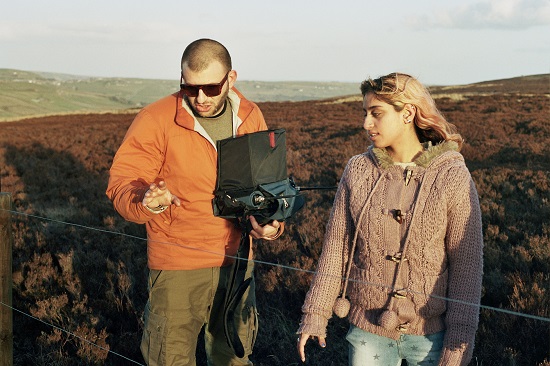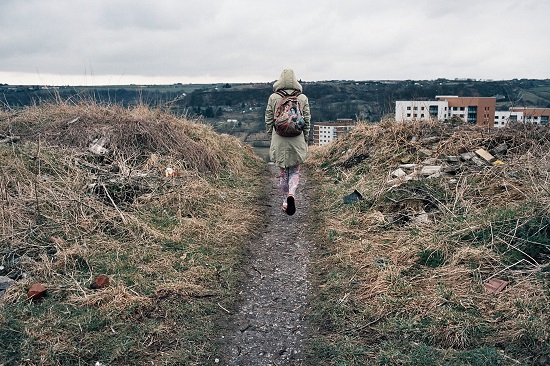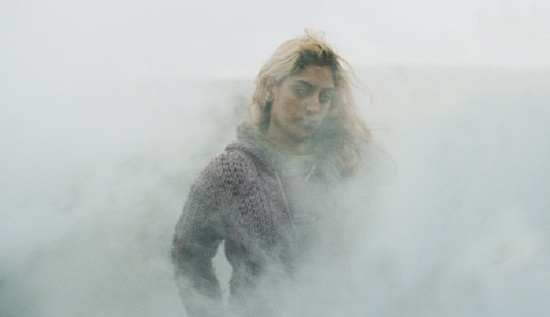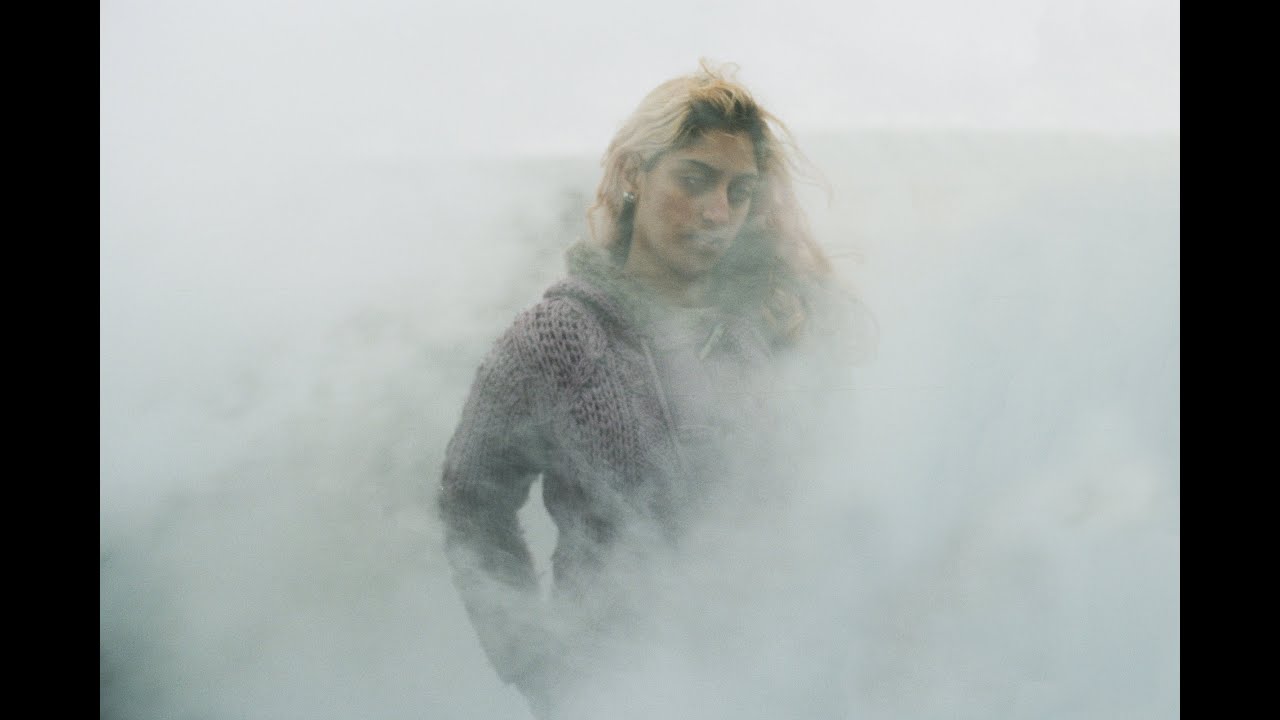With Catch Me Daddy, acclaimed music video director Daniel Wolfe and his brother Matthew have created an extraordinarily powerful and impressive debut feature which places focus on the distressing subject of honour killings. Laila (Sameena Jabeen Ahmed), a British Pakistani teenager, is forced to flee her home with her white boyfriend when her brother and a couple of bounty hunters turn up to hunt her down and bring her back to her father. Their thriller turns the Yorkshire moors into a lawless, disturbing backdrop and its noirish qualities deliver a visceral experience.
After my tape recorder is turned off and the mood a little more relaxed Daniel reveals that his fondest film memories include watching Westerns with his grandmother and that they have shaped his film making. Later on in the week when I speak to his brother Matthew, I ask if any Westerns influenced the visual style of Catch Me Daddy. He says: “I wouldn’t say any directly influenced the visual style. The influence there is the power of cinema – I mean becoming excited about films, the excitement at being allowed to stay up and watch a film. When we were out in town with my Gran she used to say ‘The sights you see when you’re out without your gun.’”
What motivated you to write a script about this difficult subject matter?
Matthew: These are violent, misogynistic crimes which do happen. When we saw an article detailing the use of hired white thugs, in this instance to kidnap and execute a British Pakistani woman’s husband, we saw an angle. It had become a financial transaction. A newspaper headline is inevitably reductive and sensationalist. It allows no real understanding of the conflicts. We wanted to explore freedom and control.
Daniel: We also met a lady called Deeyah [Khan] very early on, who made a documentary about Banaz Mahmod. It’s difficult because we wanted to tackle it but we didn’t want to make it an issues film. It’s important to bring awareness to this subject matter but at the same time we’re filmmakers and it’s important to make drama.
I thought it tackled the age old struggle between father and daughter and the idealisation of women under the patriarchy extremely well. Is that what it’s about on a more universal level?
Daniel: Exactly. People ask me what it’s about and I say it’s about the darker side of masculinity really. And the brutality of masculinity. We wanted to do a story with this strong woman. It’s a hugely complex topic and it’s hard to deal with in 90mins, so we chose to do it in a more mythic sense, or an archetypal sense. There’s a British author, Edward St Aubyn – his book, Some Hope: A Trilogy always stuck with me. While we wanted something powerful and thrilling, I also wanted to posit some hope. When a father and daughter or two human beings are together, face to face, can something cripplingly complex happen? The father is trapped in his own narrative but can he break free? I don’t know. I hope so. That’s what we wanted to explore.
In your research for Catch Me Daddy did you come across many cases like this and how did it affect the evolution of your script?#
Matthew: Yes. While these crimes are not widespread, we spent eight months street casting and we met four girls who had been in similar situations. The whole street casting process informed the script and all the characters, not just Laila.
Daniel: We sat in a house in Oldham with a girl who was on the run from her family with her white boyfriend. We had tea. She knew she was too old to play the character, but she told the casting director she wanted to talk to us. We sat for three hours just chatting about their story. We met a girl who was hiding out in Leeds and she was not in a great way. She was drinking heavily. She could have been right for the part but didn’t really want to do it and we didn’t want to push her. Her story was awful and tragic, yet hopeful because she was kind of in a better place. All the research informed the screenplay massively.
The intensity and pace of the film reminded me of another excellent debut film, Pusher by Nicolas Winding Refn. Which filmmakers have influenced you?
Daniel: A very good film, except he was younger! We like him, but I wouldn’t say he’s a big influence. But we definitely wanted to go for a visceral experience. When I saw Pusher I was working in a video shop in Stoke Newington. That trilogy blew us away. Just that visceral, raw energy. I’m glad you said it because I’ve been talking about slightly more esoteric filmmakers today. I’ve been talking about the poetry of it and the Ted Hughes poem we use, and hopefully it’s got some of that too. But I do like raw, visceral films. I think he’s a very good example. We love Peckinpah and Pasolini. Bruno Dumont is our utter favourite. Lynne Ramsay’s Ratcatcher blew me away.
Refn also makes great use of the natural and urban landscapes. I particularly enjoyed the milkshake shop scene in Catch Me Daddy. It felt entirely natural. Where did you shoot the majority of your film?
Daniel: A lot of it was in Mixenden, which is near Halifax. Have you ever seen a film called Twockers by Pawel Pawlikowski? He shot it there. I deliberately didn’t watch it when I found out because I didn’t want it influence me. We found the milkshake bar and the kid there. That was one of my favourite scenes. Lovely kid who had never made a milkshake in his life. We trained him up and taught him how to use the blender. Sameena was on absolutely brilliant form. That’s her banter. That’s both Laila and Sameena at once, which is something I like and you can get when street casting.
Sameena Jabeen Ahmed is a great find. Can you tell me why you chose her out of everyone who auditioned for the lead role?
Daniel: She just had a spark and energy. We fought for her and she’s done so well. It’s so surreal for me so it must be even more surreal for her. She won best newcomer twice but she was also nominated for best actress alongside Keira Knightley. She’s pretty tough. She’s a sports coach so she’s physical. She’s got that mentality and she doesn’t want to fail. Her big fear was to sit in the cinema and it not be good. Her hard work paid off. She’s a tremendous person.
I also loved the scene with Laila dancing to Patti Smith’s Horses, why did you decide to use that song?

Daniel: I love Patti Smith, she’s brilliant. And I love that album in particular. We’d be writing and we’d put that on and suddenly you’re rocking. It makes you feel young. There’s a teenage feel to it even though it’s more sophisticated. It’s not teenage bubble-gum pop, it’s a sophisticated nine minute track. It just felt right. We played it to Sameena and she really liked it, that was important.
Robbie Ryan was the cinematographer for Catch me Daddy, and you’ve worked with him previously on some of your music videos. Why did you decide to collaborate on a feature film with him?
Daniel: I think he’s an amazing cinematographer. Robbie read the script and he really loved it. He gets on well with my brother which is really important. He’s just very easy with street cast people. Some cameramen can put off street cast people but he’s very sensitive. I like crew that are gentle and respectful of the street casting process. Robbie can make anyone feel at home. That, plus he’s a breathtakingly good photographer. He doesn’t like to use a lot of light. He’s massively pro-film. I wanted someone who would be on my side to not shoot digital and to fight that.
OK, let’s talk about the music choices. For me, I felt there was a great juxtaposition between what different players in the film were listening to at any given time.
Daniel: Basically we wrote backstory for all the characters and then we started to write playlists for all the characters. We just let the lads in the car play whatever they want. Me and my brother like a lot of hip-hop and particularly Southern rap. Alley Boy we were mad for at the time. We played it to the lads and they liked it. What’s interesting about Alley Boy is it’s nihilistic and in that track in particular, there’s a nihilism to it that they’ve got nothing to live for. I just thought there was something interesting in the appropriation of Atlanta rap to Yorkshire. Sameena’s playlist was eclectic. She walked into the casting listening to Nikki Minaj, so we know she liked her. Connor is a blues man.
Matthew: There was a blurring here because Connor [McCarron] who played Aaron was massively into music – Tim Buckley, The Doors, Nirvana. He’s a dreamer, an outsider, so that stuff captured that feeling.
The score is spare and effective, can you tell me more about the process of composing it?
Matthew: Yes, I worked with Daniel Thomas Freeman on the score. I’d heard his album The Beauty Of Doubting Yourself and found it very moving. It’s a dark album but with strong emotion. Very visual, often conjuring up primal landscapes. I thought we could create something together that would really work in the world of Catch Me Daddy. We wanted the music to feel like it comes from the landscapes. We didn’t want recognisable sounds that would pull people out of the story. We used stripped back instrumentation, mainly consisting of piano, percussion, and oscillators, mashed beyond recognition to become a breathing soundscape. The score is quite spare for the beginning part of the film, gradually creeping in as the story progresses. Then much more full on in the second half to mirror Aaron and Laila’s descent into darkness as the chaos breaks loose. There was a similar approach to the camera work – starting controlled and breaking down to become more chaotic as we enter night. The opening moments of High Plains Drifter were definitely an inspiration for the score. Also Popol Vuh’s score for Aguirre, the Wrath of God, Carmine and Francis Ford Coppola’s Apocalypse Now soundtrack, and English Tudor choral music.
What role did music play in your life growing up?
Matthew: My dad used to play trumpet, his band backed a couple of soul singers when they came to England in the ’70s – Fontella Bass and Clarence Frogman Henry. Music was always around. John Martyn, Van Morrison and Art Pepper would be on loop in my dad’s car. I went to music school and after that started gigging, so music’s been a big part of my life. Until his death in 2009 I’d go religiously to John Martyn’s gigs – some of the best moments of my life. More recently Toumani Diabate is someone that blows my head off live. Other gigs that have really inspired me – seeing the whole of Boot Camp Clik together, also Brand Nubian, and then EPMD at Notting Hill Carnival when I was young.
Daniel: There was always music playing when we were kids. John Martyn was huge for us. My parents were into Van Morrison, Astral Weeks especially. Spotify emailed me at Christmas saying the album you’ve listened to most this year is Astral Weeks. That must have been the same for the last decade or more!

Catch Me Daddy is in cinemas now



